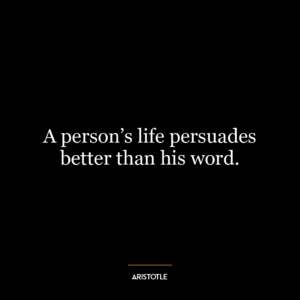The quote “Every virtue is a mean between two extremes, each of which is a vice” is a fundamental principle of Aristotle’s philosophy of ethics. The concept, often referred to as the Doctrine of the Mean, suggests that moral virtues lie between extremes and are about finding the right balance. Each virtue is the midpoint between deficiency and excess, both of which are considered vices.
For instance, courage is a virtue that sits between recklessness (an excess) and cowardice (a deficiency). Generosity, another virtue, is the mean between extravagance and stinginess. It’s not about choosing the middle for the sake of moderation, but about finding the appropriate, rational response to each situation.
Applying this idea to today’s world or personal development, it encourages balance and moderation in all aspects of life. In the context of personal development, it could involve finding a balance between self-care and self-sacrifice. For example, working hard is generally seen as a virtue, but when taken to an extreme, it can lead to burnout and health issues (excess). On the other hand, not working at all leads to laziness and unproductivity (deficiency). The virtue or the mean lies in working hard but also taking time to rest and recharge.
In the broader societal context, this philosophy can be applied to issues like free speech. The virtue lies in the balance between allowing freedom of expression (which could lead to hate speech if taken to an extreme) and censorship (which could stifle important discussions if overly applied).
The Doctrine of the Mean offers a valuable framework for ethical decision-making. It promotes balance, reason, and moderation, reminding us that both excess and deficiency can lead to negative outcomes. It’s a concept that encourages us to continually reflect on our actions, striving for the virtuous mean that leads to a good and fulfilling life.















